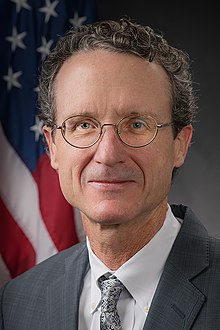
The Environmental Protection Agency (EPA) is an independent agency of the United States government tasked with environmental protection matters. President Richard Nixon proposed the establishment of EPA on July 9, 1970; it began operation on December 2, 1970, after Nixon signed an executive order. The order establishing the EPA was ratified by committee hearings in the House and Senate.

The administrator of the Environmental Protection Agency is the head of the United States Environmental Protection Agency (EPA), and is thus responsible for enforcing the nation's Clean Air and Clean Water Acts, as well as numerous other environmental statutes. The administrator is nominated by the president of the United States and must be confirmed by a vote of the Senate.

Carol Martha Browner is an American lawyer, environmentalist, and businesswoman, who served as director of the White House Office of Energy and Climate Change Policy in the Obama administration from 2009 to 2011. Browner previously served as Administrator of the Environmental Protection Agency (EPA) during the Clinton administration from 1993 to 2001. She currently works as a Senior Counselor at Albright Stonebridge Group, a global business strategy firm.

Stephen Lee Johnson is an American politician who served as the Administrator of the Environmental Protection Agency (EPA) under President George W. Bush during the second term of his administration. He has received the Presidential Rank Award, the highest award that can be given to a civilian federal employee.
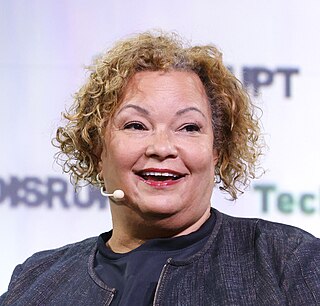
Lisa Perez Jackson is an American chemical engineer who served as the administrator of the United States Environmental Protection Agency (EPA) from 2009 to 2013. She was the first African American to hold that position.

Edward Scott Pruitt is an American attorney, lobbyist and Republican politician from the state of Oklahoma. He served as the 14th Administrator of the Environmental Protection Agency (EPA) from February 17, 2017, to July 9, 2018, during the Donald Trump presidency, resigning while under at least 14 federal investigations. Pruitt denies the scientific consensus on climate change.
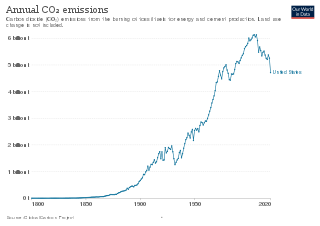
The environmental policy of the United States is a federal governmental action to regulate activities that have an environmental impact in the United States. The goal of environmental policy is to protect the environment for future generations while interfering as little as possible with the efficiency of commerce or the liberty of the people and to limit inequity in who is burdened with environmental costs. As his first official act bringing in the 1970s, President Richard Nixon signed the U.S. National Environmental Policy Act (NEPA) into law on New Year's Day, 1970. Also in the same year, America began celebrating Earth Day, which has been called "the big bang of U.S. environmental politics, launching the country on a sweeping social learning curve about ecological management never before experienced or attempted in any other nation." NEPA established a comprehensive US national environmental policy and created the requirement to prepare an environmental impact statement for "major federal actions significantly affecting the quality of the environment." Author and consultant Charles H. Eccleston has called NEPA the world's "environmental Magna Carta".

The Clean Air Act (CAA) is the United States' primary federal air quality law, intended to reduce and control air pollution nationwide. Initially enacted in 1963 and amended many times since, it is one of the United States' first and most influential modern environmental laws.
Hunton Andrews Kurth LLP, formerly known as Hunton & Williams LLP, is an American law firm. The firm adopted its current name on April 2, 2018, when it merged with Andrews Kurth Kenyon LLP.

Robert Perciasepe is an American former government official who currently serves as a senior adviser to McKinsey and Company and the nonprofit Center for Climate and Energy Solutions, following his role as President of the organization. He served as the Deputy Administrator and Acting Administrator of the U.S. Environmental Protection Agency during the administration of Barack Obama.

Regina McCarthy is an American air quality expert who served as the first White House national climate advisor from 2021 to 2022. She previously served as the thirteenth Administrator of the Environmental Protection Agency from 2013 to 2017.

The Clean Water Rule is a 2015 regulation published by the U.S. Environmental Protection Agency (EPA) and the United States Army Corps of Engineers (USACE) to clarify water resource management in the United States under a provision of the Clean Water Act of 1972. The regulation defined the scope of federal water protection in a more consistent manner, particularly over streams and wetlands which have a significant hydrological and ecological connection to traditional navigable waters, interstate waters, and territorial seas. It is also referred to as the Waters of the United States (WOTUS) rule, which defines all bodies of water that fall under U.S. federal jurisdiction. The rule was published in response to concerns about lack of clarity over the act's scope from legislators at multiple levels, industry members, researchers and other science professionals, activists, and citizens.
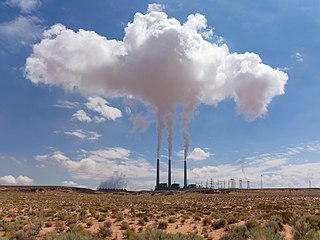
The Clean Power Plan was an Obama administration policy aimed at combating climate change that was first proposed by the Environmental Protection Agency (EPA) in June 2014. The final version of the plan was unveiled by President Barack Obama on August 3, 2015. Each state was assigned a target for reducing carbon emissions within its borders, which could be accomplished how the states saw fit, but with the possibility of the EPA stepping in if a state refused to submit a plan. If every state met its target, the plan was projected to reduce carbon emissions from electricity generation by 32 percent relative to 2005 levels by 2030, and would have reduced other harmful air pollution as well.
The environmental policy of the first Donald Trump administration represented a shift from the policy priorities and goals of the preceding Barack Obama administration. Where President Obama's environmental agenda prioritized the reduction of carbon emissions through the use of renewable energy with the goal of conserving the environment for future generations, the Trump administration policy was for the US to attain energy independence based on fossil fuel use and to rescind many environmental regulations. By the end of Trump's term, his administration had rolled back 98 environmental rules and regulations, leaving an additional 14 rollbacks still in progress. As of early 2021, the Biden administration was making a public accounting of regulatory decisions under the Trump administration that had been influenced by politics rather than science.

J. Richard "Rick" Capka was sworn in as the 16th Federal Highway Administrator on May 31, 2006 and served until he resigned on January 24, 2008. Previously, Capka had been appointed the Deputy Administrator of the Federal Highway Administration (FHWA) in August 2002 and was the Acting Administrator since August 2005. In those capacities, he helped to prepare the Bush administration's proposed transportation reauthorization legislation; to shape the management of highway mega-projects and; to develop national programs and initiatives to relieve congestion. He was also the first U.S. Department of Transportation (USDOT) official to deploy to Iraq (2003) and led the highly successful federal response to the tragic 2007 collapse of the I-35 W Bridge in Minneapolis, MN.

Andrew R. Wheeler is an American attorney who served as the 15th administrator of the United States Environmental Protection Agency (EPA) from 2019 to 2021. He served as the deputy administrator from April to July 2018, and served as the acting administrator from July 2018 to February 2019. He has been a senior advisor to Governor of Virginia Glenn Youngkin since March 2022. He previously worked in the law firm Faegre Baker Daniels, representing coal magnate Robert E. Murray and lobbying against the Obama administration's environmental regulations. Wheeler served as chief counsel to the United States Senate Committee on Environment and Public Works and to the chairman U.S. senator James Inhofe, prominent for his rejection of climate change. Wheeler is a critic of limits on greenhouse gas emissions and the Intergovernmental Panel on Climate Change.

David Patrick Ross is an American environmental and land-use lawyer who served as the Assistant Administrator of the Environmental Protection Agency from 2018 to 2021. Prior to his EPA role, he was a Wisconsin assistant attorney general and director of the state's environmental-protection judicial unit.

Michael L. Dourson is an American toxicologist and Director of Science at the nonprofit organization, Toxicology Excellence for Risk Assessment. He was formerly a senior advisor to the Administrator of EPA, and prior to that, a professor at the Risk Science Center at the University of Cincinnati College of Medicine. Prior to joining the University of Cincinnati, he was founder and president of the nonprofit Toxicology Excellence for Risk Assessment. Earlier in his career, he was employed by the Environmental Protection Agency Environmental Criteria and Assessment Office, among other assignments.
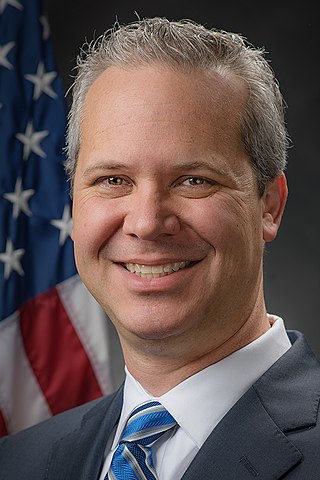
Matthew Zane Leopold is an American attorney at Hunton Andrews Kurth LLP and former government official who served as the Assistant Administrator of the United States Environmental Protection Agency. Prior to assuming this role, Leopold was a lawyer with the law firm of Carlton Fields.

Michael Stanley Regan is an American environmental regulator. He has been serving as the 16th administrator of the Environmental Protection Agency since March 11, 2021. He is the first African American man to serve in the role.
